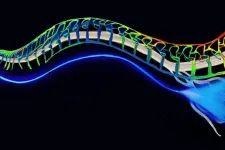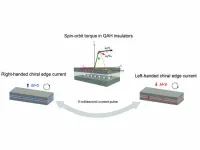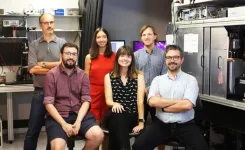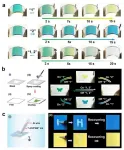(Press-News.org) Study suggests that adhering to a Mediterranean diet may alleviate or prevent posttraumatic stress disorder (PTSD) symptoms
The human gut microbiome has a significant impact on our health. Research has shown that it can influence the development and response of emotions, but the relationship between posttraumatic stress disorder (PTSD) and the gut microbiome has been unexplored. PTSD is a fear-based mental health disorder that develops in some individuals who experience a disturbing and horrifying situation involving severe injury, actual or threat of death, or violence. A new study by investigators from Brigham and Women’s Hospital, a founding member of the Mass General Brigham healthcare system, and Harvard T.H. Chan School of Public Health systematically investigated the relationship between PTSD, diet, and the gut microbiome. Their study found that participants who adhered to a Mediterranean diet experienced decreased PTSD symptoms. Their results are published in Nature Mental Health.
“There is a very intriguing relationship between the human gut microbiome and the brain,” said co-corresponding author Yang-Yu Liu, PhD, of the Channing Division of Network Medicine within the Department of Medicine at Brigham and Women’s Hospital. “Through our study, we examined how factors, like diet, are associated with PTSD symptoms. While further research is needed, we are closer to being able to provide dietary recommendations for PTSD prevention or amelioration.”
The burden of PTSD often extends beyond the individual; family members, the healthcare industry and society are also affected by the mental health disorder. In addition, individuals with PTSD have an increased risk of developing chronic diseases such as coronary heart disease, stroke, diabetes, autoimmune diseases and premature death. Understanding the role of diet and the microbiome could improve recommendations and outcomes for patients with PTSD.
“Examining the gut-brain axis can provide insights on the interdependence of mental and physical health,” said co-corresponding author Karestan Koenen, PhD, of the Department of Epidemiology at Harvard T.H Chan School of Public Health. “Our findings suggest the PTSD and human gut microbiome relationship is a promising area of research that may lead to recommendations for alleviating the down-stream negative health consequences of PTSD.”
The team collected data from 191 participants in sub-studies of the Nurses’ Health Study-II (NHS-II), which included the Mind-Body Study (MBS) and the PTSD Substudy. Participants were assigned to three groups: probable PTSD, exposed to trauma but no PTSD, and no trauma exposure. All the participants submitted two sets of four stool samples, once at the beginning of the study and again six months later. The samples were collected to provide microbial DNA information and to confirm that the participant’s gut microbiome was stable over six months.
The team evaluated the associations between overall microbiome structure and host factors, including PTSD symptoms, age, body mass index (BMI) and dietary information. From this evaluation, the researchers found several host factors (BMI, depression, and antidepressants) associated with the microbiome structure.
Next, the researchers assessed the relationship between the available dietary information and PTSD symptoms. The team found that participants who adhered to a Mediterranean diet experienced fewer PTSD symptoms. In particular, they found that the consumption of red and processed meats was positively associated with PTSD symptoms, while the consumption of plant-based foods was negatively associated with PTSD symptoms.
Lastly, the team employed the generalized microbe–phenotype triangulation (GMPT) method to examine the link between PTSD symptoms and the gut microbiome signatures, aiming to identify putative PTSD protective species. They identified Eubacterium eligens as the top PTSD putative protective species. To test the consistency of this signature over time, the team found that the inverse association of E. eligens abundance with PTSD symptoms was highly consistent across all four time points. They further demonstrated that E. eligens was positively associated with the enriched components of the Mediterranean diet (such as vegetables, fruits, and fish) and that E. eligens was negatively associated with red/processed meat, which people following a Mediterranean diet limit or avoid.
The team notes limitations to their study, including using a short screening scale for PTSD (instead of a formal clinical diagnosis of PTSD). However, the results offer insights for future studies examining other mental health disorders and dietary interventions to improve recommendations to alleviate or prevent symptoms.
“It’s exciting that our results imply that the Mediterranean diet may provide potential relief to individuals experiencing PTSD symptoms,” said Liu. “We are eager to learn more about the relationship between PTSD, diet, and the gut microbiome. In a future study, we will attempt to validate the efficacy of probiotics as a method to prevent PTSD.”
Disclosures: The authors declare no competing interests.
Funding: This work was supported by the National Institutes of Health (R01AI141529, R01HD093761, RF1AG067744, UH3OD023268, U19AI095219, and U01HL089856, R01MH101269), the Harvard T.H. Chan School of Public Health Dean’s Fund for Scientific Advancement Incubation Award, the Biology of Trauma Initiative (BTI) of Broad Institute, the Traumatic Brain Injury and Psychological Health Research Program (Focused Program Award) under Award No. (w81XWH-22-S-TBIPH2) endorsed by the Office of the Assistant Secretary of Defense for Health Affairs in the Department of Defense.
Paper cited: Ke, S. et al. “Association of probable post-traumatic stress disorder with dietary pattern and gut microbiome in a cohort of women.” Nature Mental Health. DOI: 10.1038/s44220-023-00145-6
###
END
About The Study: The findings of this study that involved the use of data from Hong Kong and Singapore suggest that trust in health authorities was fundamental to overcoming COVID-19 vaccine hesitancy. As such, engendering trust in health care professionals, experts, and public health agencies should be incorporated into pandemic preparedness and response.
Authors: Michael Y. Ni, M.D., of the University of Hong Kong, is the corresponding author.
To access the embargoed study: Visit our For The Media website at this link https://media.jamanetwork.com/
(doi:10.1001/jamanetworkopen.2023.37909)
Editor’s Note: Please see the article ...
About The Study: In this study of 394 individuals, females with a family history of mood disorders were prone to weight gain starting around puberty and predating mood disorder onset. Early interventions aiming to prevent adverse mental and physical outcomes in this vulnerable group need to start in childhood.
Authors: Rudolf Uher, M.D., Ph.D., of Dalhousie University in Halifax, Nova Scotia, Canada, is the corresponding author.
To access the embargoed study: Visit our For The Media website at this link https://media.jamanetwork.com/
(doi:10.1001/jamanetworkopen.2023.38540)
Editor’s ...
Scientists have a new tool to precisely illuminate the roots of nerve pain.
Engineers at MIT have developed soft and implantable fibers that can deliver light to major nerves through the body. When these nerves are genetically manipulated to respond to light, the fibers can send pulses of light to the nerves to inhibit pain. The optical fibers are flexible and stretch with the body.
The new fibers are meant as an experimental tool that can be used by scientists to explore the causes and potential treatments for peripheral nerve disorders in animal models. ...
UNIVERSITY PARK, Pa. — A new electrical method to conveniently change the direction of electron flow in some quantum materials could have implications for the development of next-generation electronic devices and quantum computers. A team of researchers from Penn State developed and demonstrated the method in materials that exhibit the quantum anomalous Hall (QAH) effect — a phenomenon in which the flow of electrons along the edge of a material does not lose energy. The team described the work in a paper appearing today (Oct. 19) in the journal Nature ...
Touch plays a fundamental role in our physical, emotional, and social well-being. From a primary way of conveying emotions to sensory integration, it is crucial for the complex growth of cognitive, emotional, social, and behavioral abilities especially during the early development of infants and children. Touch allows us to build connections with others, eases pain and stress, and helps us to understand the world around us giving crucial information such as the texture, temperature, and shape of objects.
When sensing any stimuli, such as when the body is being touched, the mechanical signals are transformed into biological responses ...
A breakthrough development in photonic-electronic hardware could significantly boost processing power for AI and machine learning applications.
The approach uses multiple radio frequencies to encode data, enabling multiple calculations to be carried out in parallel.
The method shows promise for outperforming state-of-the-art electronic processors, with further enhancements possible.
In a paper published today in Nature Photonics, researchers from the University of Oxford, along with collaborators from the Universities of Muenster, Heidelberg, and Exeter, report on their development ...
In recent years, self-powered electrochromic (EC) devices have shown significant potential in various fields such as optoelectronics, sensors, and security systems. These self-powered EC systems, capable of reversible color switching without external power sources, have garnered considerable interest for next-generation electronic devices. However, this field is still in its infancy, with several unresolved challenges, including monochromatic displays, limited cycle durability, and the use of aqueous electrolytes. All these limitations have become ...
Global coastal adaptations are ‘incremental in scale’, short-sighted and inadequate to address the root causes of vulnerability to climate change, according to an international team of researchers.
The 17 experts, including Prof Robert Nicholls, Professor of Climate Adaptation at the University of East Anglia (UEA), have contributed to the paper, ‘Status of global coastal adaptation’, which is published today in Nature Climate Change.
Prof Nicholls said: “Recent analyses conclude that despite adaptation undertaken in all regions and sectors, global action remains incremental in scale: policies and projects ...
A “two-for-one” cancer immunotherapy is potentially more effective and at least as safe as standard immunotherapies, physician-scientists from UPMC Hillman Cancer Center who led an international, early-phase clinical trial report today in the journal Nature Medicine.
The findings, which involved hundreds of patients with different types of advanced solid tumors or blood cancers, point to an enticing new path for bispecific therapies that more efficiently unleash the patient’s own immune system to eliminate the cancer.
“No approved ...
An international team of scientists has recently developed a novel type of nano engine made of DNA. It is driven by a clever mechanism and can perform pulsing movements. The researchers are now planning to fit it with a coupling and install it as a drive in complex nano machines. Their results were just published today in the journal Nature Nanotechnology.
Petr Šulc, an assistant professor at Arizona State University's School of Molecular Sciences and the Biodesign Center for Molecular Design and Biomimetics, has collaborated with professor ...






